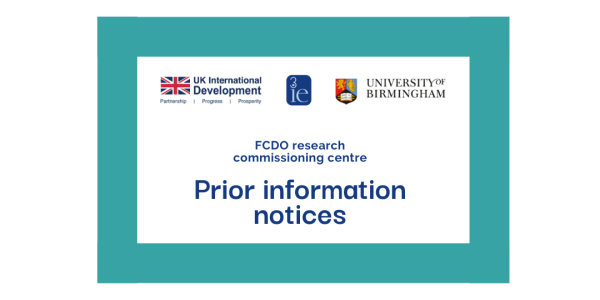Research Commissioning Centre: Upcoming calls for proposals

Research Commissioning Centre: Upcoming calls for proposals
Through our recently announced Foreign, Commonwealth and Development Office (FCDO) Research Commissioning Centre we intend to launch several calls for proposals in early 2024. The research will cover a range of development and diplomacy topics.
If you are interested in receiving updates about the upcoming opportunities, please sign up here.
Official Development Assistance (ODA)
Evidence on Evidence Use Programme
While the case for evidence use in policymaking is difficult to refute, with more than 40 years of research and drive to increase evidence uptake in policy, barriers to evidence use remain and governance around evidence use remains weak . Barriers are particularly strong in low- and lower-middle- income countries. Most of the current research on the use of evidence in policymaking has engaged in a limited manner with the political and institutional nature of decision-making. Improving the use of evidence in policy will require the establishment of principles of what would constitute good evidence to inform policy, along with good use of evidence within a policy process.
We will issue a call for proposals for research to understand and generate evidence on the barriers, facilitators, politics, institutional factors around evidence use and to identify effective policies, interventions and institutions that have helped bridge the gap between evidence and policy. This will focus on evidence use and uptake within developing countries, with a particular focus on evidence use within policymaking for economic development.
Platform for Political Economy Research: Politics of Infrastructure Megaprojects
Across the world, governments embark on ambitious infrastructure megaprojects, costing from tens of millions to billions of dollars. While megaprojects are intended to have transformational effects on growth and development, their size, scale, longevity, and technical and institutional complexity make them inherently risky. While there are many examples of high-return megaprojects, others remain unfinished; fail to improve quality of life and access to services; have led to forced resettlement; aggravated conflict; been associated with grand corruption scandals; or have resulted in debt distress or default.
This call for proposals will fund research that aims to address the evidence gap on the politics of infrastructure megaprojects framed around i) politics, ii) governance, iii) financing, and iv) technology and new data. It will generate operationally relevant evidence to improve the prioritisation, costing, design, procurement, and tendering processes that underpin megaprojects.
Technology and Governance Evidence Platform
On behalf of the Politics, Conflict and Humanitarian (PCH) and Technology Innovation Units at FCDO’s Research and Evidence Directorate, we will commission a new evidence platform on emerging technologies' impact on governance, local communities, and global issues, including service delivery, authoritarian regime, elite capture, violence, organised crime, climate concerns, and transnational uses of technology.
The platform will serve as a hub for mobilising expertise and research on tech and governance, generating evidence on ‘what works’ for building technology governance across a range of priority areas and geographies.
Use of Artificial Intelligence in Food and Agriculture
The Food and Agriculture Research Team in FCDO’s Research and Evidence Directorate (RED) is looking to commission work on the use of Artificial Intelligence (AI) in food and agriculture.
This commission will cover two main areas:
The first piece would examine whether there is sufficient depth in the market to support early-stage AI application to agriculture in developing countries. FCDO is considering a potential challenge fund model to support the development and application of AI to agriculture - the fund would seek to gain exposure to cutting-edge AI approaches in agriculture and support those with the potential to have the largest or most transformative impact, whilst generating the best evidence of effective approaches. It would also offer the opportunity to both tackle and understand barriers to adoption.
The second piece is a research-focused landscape survey that aims to capture where AI is having the deepest impact on agriculture in developing countries and where it could have the most impact in the future. This will include an assessment of where concessional financing to support AI application to agriculture would have the most impact.
Non-Official Development Assistance (Non-ODA)
Impact of Climate Change on Rail Operations in Turkey
Climate change is one of the most urgent crises facing the global community. The railway industry is both at risk of the effects of a changing climate and a potential contributor to the decarbonisation of transport. Given the high-risk levels of the climate emergency, its impact on transport and the critical role it plays in national development and reducing spatial inequalities, it is essential that policymakers prepare for long-term scenarios being mindful of the anticipated changes.
There is a broad recognition that railways need to be made more resilient to thrive in climate setbacks. Building climate-resilient key infrastructure is key to ensuring growth and preparedness when faced with challenges in the future.
The key objective of this analysis is to understand the impact of climate change on railroad infrastructure, maintenance, and railway system operations (in coordination with the respective rail authorities with the help of British Embassy Ankara) in Turkey. Doing so will help inform and define potential areas of UK contribution through technological solutions and services. In the long term, it will improve UK-Turkey collaboration when tackling climate change and enhance sustainable development policies and the economic improvement around this sector.
Grey Economy in the Baltic Region, Georgia, Moldova, Cyprus, and Malta: Evidence on Policy Actions
The grey economy represents a significant share of the economy of countries worldwide, with no exception for the Baltic countries. Despite its contribution to the GDP and employment creation, the grey economy is often associated with lower quality of employment and higher tax avoidance. With this context, the objective of this project is to identify effective policies that can be deployed to reduce the grey economy in the Baltic countries, Malta, Cyprus, Georgia, and Moldova.